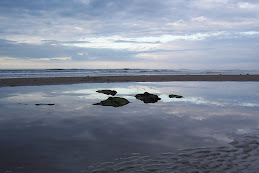Mary's MotherShe was brought up to know better.
It's the son of god, she tells me.
A poor excuse for not waiting,
for opening her legs before she ought.
She'll never know how
I meekly hid my face in shame
when she was expected before her time.
A proud one, our Mary,
my husband's doing.
If she was to be the only one,
then he would lavish all on her,
not me,
for he could see as well as I could,
the slope of her nose,
the tint of her hair,
the curve of her stubborn chin,
not his, but
my brother-in-laws.
Betraying twice over, my sister and my husband,
I could not find forgiveness for those
blue eyes which should have been brown.
My sin, my twice-fold sin,
how could I feel other than punished
and punishing?
And now,
bold as you like,
she holds her rounded belly.
The women gather and toss broken coins, spin needles,
touch her with a gentleness I have never managed.
She's carrying high, it's a boy,
they say.
The son of god, Mary replies,
with a certainty and a delight that cracks my chest again.
If only I'd thought of that one, all those years ago.
She's clever, my cuckoo daughter,
and she doesn't get that from me.
The Minotaur's Mother piece I was working on has evolved.
I now have what I hope will be a performance piece for many voices.
It's called, for now, Into the Labyrinth, and this is an extract.

